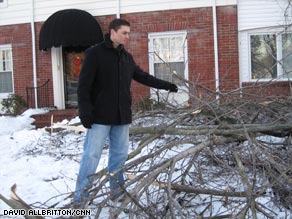Kentucky National Guard goes door-to-door to deliver aid
- Story Highlights
- NEW: 4,600 National Guard troops going door-to-door to distribute water, food
- NEW: At least six shelters without power Saturday, including nursing homes
- Hundreds of thousands of Kentuckians without electricity and fresh water
- Expected rising temperatures could bring falling ice, wet roads
- Next Article in U.S. »
(CNN) -- Declaring that Kentucky is "in the middle of the biggest natural disaster that this commonwealth has ever experienced," the governor sent National Guard troops door-to-door Saturday to assist people suffering from the aftermath of this week's ice storm.

John Randolph moves fallen branches at his home in the Louisville, Kentucky, area Sunday.
The storm has left hundreds of thousands of Kentuckians without electricity and fresh water, sending many to seek refuge in shelters across the state.
Gov. Steve Beshear said it was unclear how long it would take to fully restore services across the state.
Of 120 counties in the state, 91 had declared emergencies, Beshear said at a news conference.
At least six of more than 100 shelters for storm victims remained without power Saturday, Beshear said, and those six shelters included some nursing homes.
"They are our first priority," Beshear said.
The governor called up 4,600 National Guard troops Saturday -- the largest Guard mobilization in the state's history, according to the governor's office -- to distribute water, food and other supplies.
Their first duty will be a door-to-door canvass of "every house in every county that has been affected by this disaster," Beshear said.
The storm, which pummeled Kentucky on Tuesday and Wednesday, left ice-laden power lines and tree branches still drooping heavily Saturday, hampering efforts to restore infrastructure and deliver relief to residents without power. ![]() See images of the ice storm's aftermath »
See images of the ice storm's aftermath »
Call for help
Within Kentucky, call:The United Way: 211 (most areas)
Kentucky Division of Emergency management: 1-502-607-1600
Temperatures are expected to reach the high 40s Sunday, helping emergency management crews but also posing a risk of injuries from wet roads and falling chunks of ice, CNN meteorologist Jacqui Jeras said.
Across Kentucky, 21 deaths had been reported since the storm hit, but authorities could confirm that only seven of those were directly weather-related, Beshear said.
Electricity was being restored at a fairly rapid pace, the governor said, but about 437,000 customers remained without power as night fell Saturday, down from 545,000 earlier in the day and from 700,000 in the aftermath of the storm.
As electricity was being restored, however, emergency personnel struggled to deal with another problem: lack of water. ![]() Watch how people are helping one another »
Watch how people are helping one another »
"We've got 93 water systems with problems, 64 of them down completely," Beshear said.
"Communications have been virtually nonexistent in some areas for several days," Beshear said. "I'm sure we have people all across the commonwealth who are in their homes and who need help."
The situation in western Kentucky was particularly bad, Beshear said, with downed trees making the rural roads impassible.
The Federal Emergency Management Agency was helping, as were private organizations such as the Red Cross, which was serving at least 10,000 meals a day, spokesman Brian Quail said. ![]() Watch why people are seeking shelter »
Watch why people are seeking shelter »
Don't Miss
Gregory Rowe, who was staying at a downtown church in Louisville, said the people there had taken care of his family's "every possible need."
The family, which has four children, including a 15-month-old, lost power about 2 a.m. Wednesday, he said.
"We stuck it out until the end of the day, and when it became apparent we weren't going to get power, we started calling around to find a place," he said.
Jamie Gunnels, who was staying in a Louisville shelter with her 18-month-old son, said it was "entirely too cold" to stay in her house without power.
"We were sitting there being thankful that we still had power," she said. "A few minutes after we said we were thankful we had power, it went out."
Like Rowe, she wasn't sure when she could go home.
"They're saying an estimation of seven to 10 days," she said. "So we're making the best of it."
Meanwhile, her young son was enjoying the shelter, she said.
"He's having a ball just running around, soaking up the attention," she said.
Jewel Tomes, who lives in Leitchfield, took shelter at a high school after a complex for the elderly lost power. She was "thrilled to have a place to come to."
"The high school here was generous, and more than 500 people have been sheltered here, and we have had cots and blankets and three meals a day. And we had medication," she said Friday.
Louisville Mayor Jerry Abramson said four people had died in his city: Two elderly people and their special-needs adult child died because of an "improperly vented" generator, and another person died after using a charcoal grill as a heater for the house.

Abramson said authorities were trying to let people know they can't take generators and grills inside.
"It can kill, and it has, unfortunately," he said.
All About Winter Weather • Kentucky

 Sit tight, we're getting to the good stuff
Sit tight, we're getting to the good stuff